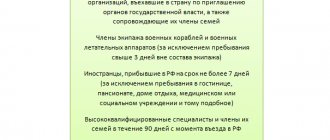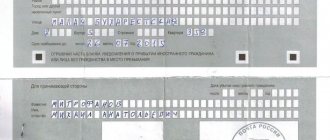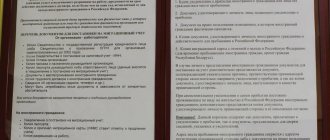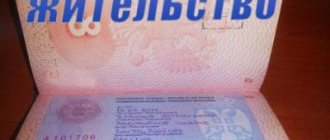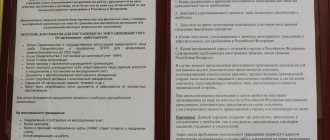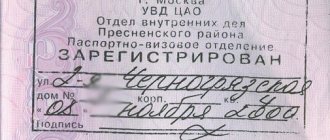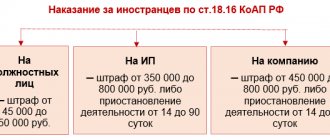From the summer of 2021, foreign employees can no longer be registered with migration authorities at their place of work, as before (Federal Law No. 163-FZ of June 27, 2018 on amendments to Federal Law No. 109-FZ). Now the legislation limits the ability of foreigners to register and instructs them to register where they “primarily reside or reside.”
However, it is worth noting that this wording does not in fact prohibit a foreigner from registering for migration with his employer. Let's figure it out.
Residential and non-residential premises
Previously, the rules stated that a foreigner could be registered for migration at his place of work, but he could only be registered in residential premises. For example, employees at construction sites were registered at the site and were housed in cabins.
Now the legislation has been “simplified” in terms of residential and non-residential premises. This means that a foreigner can obtain migration registration even at the employer’s office, that is, in a commercial premises.
But! The place of registration of a foreigner must coincide with the actual place of his primary residence. If you have registered a foreign worker in your office, then this is where he should spend the night and work. At the very least, you should be able to prove it to the inspectors.
Risks when using intermediaries
The complexity and length of the bureaucratic process of providing or verifying temporary registration entails the demand for the services of intermediary organizations. Therefore, migrants are often forced to turn to such companies to get help in checking their registration with the migration service. But it should be borne in mind that this option carries certain risks:
- unfair attitude towards the work of the organization's employees;
- provision of low quality services;
- the likelihood of receiving false documents;
- the cost of services is quite high;
- there is a possibility of receiving a falsified document.
If there is even the slightest suspicion about the integrity of the organization, you should use the services of official sources.
Accommodations
It would seem that now everything is simple: you register foreigners at the office and don’t worry about anything. However, we would like to clarify that in practice, the migration service most often refuses registration if the premises are not suitable for living in it. Be prepared to prove to the inspectors that all foreigners have sleeping places, the opportunity to go to the restroom, wash, etc.
The legislation does not put forward specific requirements for living conditions. The norms for the number of square meters per person were also abolished. But this is not a reason to abuse the new rules and register foreigners in an open-space office on the sofa. Even if the migration department allows such conditions (which is unlikely), foreign employees are unlikely to actually live in the place of such registration. And the actual stay of a foreigner at another address is a direct violation of the law!
If the notification of arrival indicates one address, but in fact the foreigner is staying at a different address, this automatically leads to the removal of the employee from the facility.
○ How to protect yourself from problems?
To avoid various problems when renting out an apartment to a foreign citizen, the first thing to do is to notify the migration service about this fact in a timely manner. You also need to draw up the lease agreement very carefully, specifying all the rights and obligations of the parties. Special attention should be paid to the issue of paying for utilities. Another way to protect yourself is to insure your home against damage and loss. Thus, when renting out an apartment, a foreign citizen needs to exercise maximum caution and fulfill his obligations to the migration service on time.
Who is responsible?
Responsibility for a foreign citizen on the territory of the Russian Federation lies with the receiving party, that is, the owner of the premises in which the foreigner is registered for migration. It is also worth noting that the owner of the premises in which the foreigner is not registered, but in fact resides, is also responsible for it.
The receiving party is obliged:
— Notify about the foreigner’s stay (register);
— Report if a foreign citizen has left (deregistered).
Do not neglect removing a foreigner from migration registration! If it is discovered that a foreigner has not been deregistered, but in fact no longer resides at the place of registration, the owner of the premises faces administrative liability and a fine of 250,000 rubles !
The employer, if he is not the receiving party (that is, does not register the foreigner at his address), is not obliged to monitor the registration of the foreign employee with migration registration. But we do not recommend leaving the situation to chance! If a foreigner detects problems with registration, the migration service automatically expels the citizen from the territory of the Russian Federation. Often such inspections end in the mass expulsion or deportation of employees, which negatively affects the work of the company in which these employees worked.
○ Problems for the homeowner.
The owner of the living space where a foreign citizen lives illegally also faces punishment.
✔ FMS fines.
If you have rented out your apartment to a migrant worker, you must notify the migration service about this. If it is discovered that you have not done this, you will face an administrative fine of 2,000 rubles. To avoid this, you need to notify the migration service about renting out an apartment within 7 days from the moment the citizen begins living in your apartment.
✔ Fictitious registration.
Temporary registration is considered fictitious in the following cases:
- During registration, false documents and deliberately false information were presented.
- The documents were submitted for registration without the actual intention of living at this address.
- Documents for accounting were submitted without the owner's intention to actually rent out the apartment.
- When establishing the fact of fictitious registration, the following types of administrative and criminal penalties are provided:
• Administrative fine in the amount of 100 to 500 thousand rubles. or wages/other income for the last three years.
• Forced labor for up to 3 years with deprivation of the opportunity to hold certain positions.
• Imprisonment for up to 3 years.
✔ Violation of the rules of residence.
Any citizen living in an apartment building must comply with its rules of residence, regardless of his status. When it comes to renting an apartment by a foreign citizen, he must also comply with all established requirements. In case of violation, the lessor bears responsibility. As a rule, this is an administrative fine, less often an appeal to court and a requirement to terminate the rental relationship.
✔ Payment of utilities.
The amount of payments for utility services is determined by the number of people living in the apartment. It doesn’t matter what type of registration they have. Therefore, if you decide to rent out an apartment to foreign citizens, keep in mind that the amount of utility bills will be increased in proportion to the number of tenants. And who will pay for them is already determined by your agreement.
✔ Taxes and benefits.
Renting an apartment requires paying taxes in the amount of 18% of annual income. Tax benefits can be obtained by registering an individual entrepreneur. In this case, you can independently choose the taxation option and reduce payments to 6%.
Note to the employer
An employer can enter into a lease agreement with a dormitory, hostel or other place of residence of foreigners and, on its own behalf, register foreign employees in these premises for migration purposes.
Thus, the employer organizes recreational facilities for its foreign employees in rented premises. Remember that a lease agreement must be concluded! This is what you will provide to the migration department as proof of the legality of foreigners’ stay at certain addresses.
Contact Lexintel specialists for advice: we will analyze your situation individually and advise you on the best way to deal with registering your foreign employees for migration registration.
How to check the authenticity of a foreign citizen’s registration?
Let's start with why this document might need to be verified for authenticity? The conviction that real registration is most often needed by those who are going to apply for a patent/TRP/residence permit, or get a job in a company where they are scrupulous about all bureaucratic nuances. But if employers do not always undertake to check the authenticity of employees’ documents, the migration authorities do this without fail. If during the process it turns out that one of the papers is “fake,” then the migrant will not only be denied the service, but may also be subject to administrative or criminal liability.
The question of authenticity is unlikely to arise among those foreigners who were personally present at the time the notification was submitted. This can be done directly at the territorial department of the Ministry of Internal Affairs or through the MFC, or mail.
Image source: pochta.ru
But if a migrant gave copies of his documents, and after a while received a ready-made registration sheet (for example, from the administrator of a hotel or hostel, or from an employer, or registering through an intermediary company), then questions may arise.
Unfortunately, there is no quick online verification of the authenticity of the registration of foreign citizens. You can find out whether information about him has been entered into the Ministry of Internal Affairs database only by sending an official request to the department of the Ministry of Internal Affairs in whose territory the registration was issued. You can do this directly - by going there and writing a free-form application. Or via the Internet - by going to the official website of the Ministry of Internal Affairs of the Russian Federation and submitting a request through the “Accepting applications from citizens and organizations” button. In the list of departments you need to select “Main Directorate for Migration Issues”. Each request can take up to 30 days to be considered, so you shouldn’t expect a quick response. Learn more about how to submit a request through the Ministry of Internal Affairs website.
Image source: MIA.RF
Procedure for registering a foreign guest
There are several ways to register a foreigner. The home owner has the right to contact the Main Department of Migration Affairs of the Ministry of Internal Affairs in person or send a notification through the post office. In addition, in many regions this service is provided by MFC divisions.
To register, you must submit the following documents:
- An application that is filled out using a special form. The form can be filled out in advance by downloading it on the GUVM website, or received in person. The application has a detachable part, which is handed to the foreigner and must be kept during the entire period of stay in Russia.
- Residential owner's passport.
- Guest ID.
- Documents confirming the legality of a foreigner’s presence in Russia.
- Documents for the apartment in which the foreigner will live (social tenancy agreement, certificate of ownership).
If the property is divided into shares, the consent of the remaining owners will be required. When a foreigner is registered in a non-privatized apartment, it is necessary to obtain the consent of the other residents
Rent amount
The amount of payment for accommodation is usually set freely by the owner himself.
He can register a person in his apartment free of charge (usually relatives or close friends), or for a certain fee, which he has the right to demand monthly or at any other time.
It is noteworthy that the owner cannot change the cost of living unilaterally without warning. Registration authorities are usually not interested in such issues, since this is solely the will and decision of the owner.
In this case, it is advisable to draw up a commercial lease agreement and describe in detail the procedure and terms of payment for accommodation.
Another important problem for the owner is the increase in utility bills. This only happens if the apartment does not have meters for water, electricity, heating, or gas.
In this case, the calculation is carried out based on clause 19 of Government Decree No. 307. The final amount is formed from the following housing nuances:
- number of all residents;
- rate;
- consumption standard;
- housing area.
Accordingly, the more temporarily registered persons live in an apartment, the more the owner pays for utilities. The legislator calculates this for reasons of increasing consumption.
To avoid overpayments for utility services, it is most reasonable to oblige temporary guests to reimburse their expenses or divide the payment in half.
IMPORTANT! If you install meters for water, electricity, heating, then payment will be made only according to their readings, and otherwise the amounts will be calculated according to established consumption standards per person.
Summing up
When a temporary registration is required, a migrant or a citizen of the Russian Federation is recommended to independently contact the Department of Internal Affairs of the Ministry of Internal Affairs. The authenticity of documents should be checked in the same way. Living without registration or using invalid papers is subject to administrative and, in some cases, criminal liability.
Makarova Natalya Nikolaevna
Lawyer at the Legal Defense Board. He specializes in administrative and civil cases, compensation for damages from insurance companies, consumer protection, as well as cases related to the illegal demolition of shells and garages.
What to do next
After the migration service officer puts a stamp on the registration of a foreigner, the tear-off part of the document is sent back to the government agencies of the receiving party. After this, this paper is handed over personally to the registered migrant. It will be an official document stating that a person has the right to reside in the state. After the registration certificate has expired, for further residence in the country it is necessary to have grounds for renewing the registration of a foreign citizen.
Rights and obligations of a registered foreigner
According to the provisions of the law, a registered foreigner acquires the right to use the premises, as well as utilities. His responsibilities include paying for these services, but payment arrangements must be agreed upon in advance.
Foreign citizens do not have the right to a share in property. You cannot claim part of the living space even if the tenant made repairs or made other improvements during his stay.
As for responsibility to neighbors, it is in any case borne by the owner. For example, if a foreign guest flooded other residents or caused damage to their property in other ways, the legal owner will have to answer.
